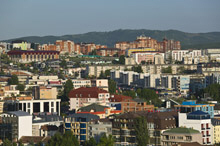
Typical street scene in Santa Ana, El Salvador. (Photo: iStock)
IMF Survey: Kosovo Receives €48 Million Installment Under IMF Loan
July 17, 2012
- Kosovo’s economy has remained largely shielded from the euro area crisis
- The program aims at restoring a sustainable fiscal position and reinforcing the financial system’s resilience
- A key medium-term challenge is to strengthen competitiveness and develop a tradable sector
The IMF’s Executive Board approved today the second tranche for Kosovo under the country’s €106.6 million Stand-By Arrangement.

Downtown Pristina, Kosovo. The economy has remained largely shielded from the euro area crisis (photo: Walter Bibikow/Newscom)
KOSOVO PROGRAM
The €48 million tranche comes after a first disbursement of €5 million that the country received when the 20-month program was approved in April 2012.
Kosovo’s economy has continued to grow despite a difficult international environment, said the IMF in completing the first review of the program today.
“Solid remittance inflows and robust lending activity by a well-capitalized and liquid banking system have supported growth,” said Johannes Wiegand, IMF mission chief for Kosovo.
Speaking to IMF Survey—the IMF’s online magazine—Wiegand discussed economic developments, the outlook, and objectives of the IMF-supported program.
IMF Survey online: What are the economic prospects for Kosovo? How does the euro area crisis affect the outlook?
Wiegand: We project the economy to grow by 3.8 percent in 2012, only modestly down from 5 percent in 2011. Thus far, Kosovo has remained largely shielded from the euro crisis, for several reasons. First, Kosovo’s exports are small. Second, financial linkages are also limited: while Kosovo’s largest banks are foreign-owned, they are funded with domestic retail deposits and do not depend on financing from their parents. Further, Kosovo’s debt is not traded in cross-border financial markets. Third, economic growth depends importantly on remittances and foreign direct investment from the Kosovar diaspora that lives primarily in Germany and Switzerland—economies that have held up well.
IMF Survey online: What is the history of the IMF's engagement with Kosovo?
Wiegand: Kosovo became a member of the IMF in 2009. However, already before membership the IMF provided extensive technical assistance, including when Kosovo was under administration of the United Nations (1999–2008).
In July 2010, the Executive Board of the IMF approved a first Stand-By Arrangement (SBA). The arrangement went soon off-track, however, reflecting in part outsized public sector wage increases in the context of the 2011 budget. The Kosovar authorities expressed an interest in continued close cooperation with the IMF and requested a staff-monitored program (SMP) through end-2011. Implementation of the SMP has been broadly satisfactory, with significant overperformance especially relative to fiscal targets, paving the way for negotiations on a new Stand-by Arrangement. The new SBA was approved by the IMF's Executive Board this April.
IMF Survey online: What are the key objectives of the authorities’ program?
Wiegand: The first objective is to restore a sustainable fiscal position that would keep public debt below 30 percent of GDP in the long-term. During the 2011 Article IV consultations, the IMF assessed that relative to this yardstick, Kosovo’s fiscal stance was too expansionary by about 3 percent of GDP. Significant adjustment has already been achieved in the context of the SMP and the 2012 budget. A fully sustainable position is targeted for 2014.
The second objective is to restore an adequate level of cash buffers. In a unilaterally euroized economy like Kosovo’s, cash buffers insure against possible fiscal and financial risks and have a similar function as international reserves in a country with an own currency.
The third objective is to provide orientation for fiscal policy in the long-run. With no independent monetary policy, fiscal policy is the main tool to stabilize and anchor the economy. A technical assistance mission from the IMF’s Fiscal Affairs Department has just returned from Pristina (Kosovo’s capital), where it discussed with the authorities options for a fiscal rule that could be introduced next year.
The fourth objective is to reinforce the resilience of the financial system. As Kosovo is euroized, the central bank cannot generate liquidity on its own. After the installment tied to this review becomes available, the authorities intend to fund a central bank facility designated for emergency liquidity assistance. Moreover, in April Kosovo’s assembly passed a revised banking and microfinance law that strengthens the central bank’s capacity to resolve troubled institutions.
IMF Survey online: In your opinion, what are the medium-term macroeconomic challenges that Kosovo has to deal with?
Wiegand: A key medium-term challenge is to build a competitive economy and develop a tradable sector, to reduce the economy’s dependence on transfers and create the conditions for durable, robust growth. Critical to this effort are initiatives to strengthen the institutional framework and business climate, as well as investments in infrastructure and education.
More generally, Kosovo is a young country whose capital and social spending needs are large. Policymakers are under considerable and often understandable pressure to address these pressures rapidly. To prevent putting macroeconomic stability at risk, it is indispensable to carefully prioritize, cost, and sequence spending initiatives. Success requires broad political support.







